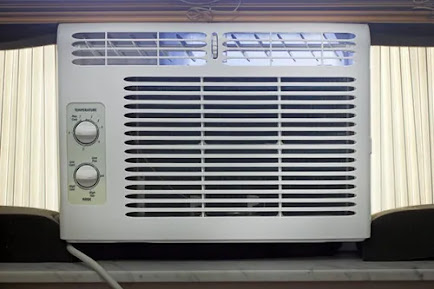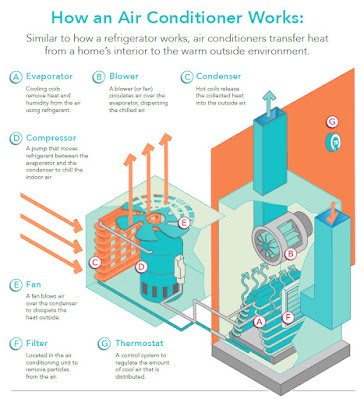COMMERCIAL AIR CONDITIONERS.
Commercial air conditioners, are specifically designed to provide cooling and climate control in large manufacturing or industrial facilities. These air conditioners are different from residential or office air conditioners in terms of size, capacity, and functionality. Commercial air conditioners are also known as industrial air conditioners.
Detailed information on commercial air conditioners.
Capacity
Commercial air conditioners are designed to handle high cooling loads to maintain comfortable temperatures in large spaces. They have higher cooling capacities compared to residential air conditioners, typically ranging from tens of tons to hundreds of tons. This capacity is essential to accommodate the heat generated from machinery, equipment, and processes within the factory.
Zone Cooling
Commercial air conditioners often incorporate zone cooling capabilities, allowing different areas or zones within the facility to be cooled independently. This ensures efficient cooling based on specific requirements and reduces energy consumption by only cooling occupied or critical areas.
Ventilation
In addition to cooling, commercial air conditioners provide adequate ventilation to maintain air quality and circulation within the facility. They incorporate robust ventilation systems that can handle the large volume of air exchange needed in an industrial environment.
Air Distribution
Commercial air conditioners employ ductwork systems to distribute cooled air evenly throughout the facility. These ductworks are designed to handle high airflow and are often larger in size compared to residential systems. They may also utilize high-velocity or low-velocity air distribution methods based on the specific requirements of the factory.
Durability and Reliability
Commercial air conditioners are built to withstand the harsh conditions and heavy usage typically found in industrial environments. They are constructed with durable materials and have enhanced resistance to dust, debris, and chemicals commonly present in factories. These units are designed for longevity and to continue operating reliably even in demanding conditions.
Energy Efficiency
Energy efficiency is a crucial aspect of commercial air conditioners due to the large cooling loads they handle. Manufacturers focus on developing energy-efficient systems, including advanced compressor technology, variable speed controls, and intelligent control systems to optimize cooling and reduce energy consumption.
Maintenance and Service
Commercial air conditioners often require regular maintenance and service to ensure optimal performance. Manufacturers or service providers offer maintenance contracts to inspect, clean, and repair the units periodically. This helps to maximize efficiency, extend the lifespan of the equipment, and minimize downtime.
It's essential to consult with industry professionals or HVAC experts to determine the specific requirements and design considerations for commercial air conditioners, as each facility has unique cooling needs based on its size, layout, equipment, and processes.
Application of commercial air conditioners.
Commercial air conditioners are used in various applications across a wide range of industries. Some common applications of commercial air conditioners include:
Office buildings
Commercial air conditioners are essential in office buildings to provide a comfortable working environment for employees. They help regulate the temperature, humidity, and air quality, ensuring a pleasant atmosphere for increased productivity and employee satisfaction.
Retail stores
Air conditioning is crucial in retail stores to create a comfortable shopping environment for customers. By maintaining a cool and pleasant atmosphere, commercial air conditioners can enhance the shopping experience and encourage customers to spend more time in the store.
Hotels and hospitality
Commercial air conditioners are extensively used in hotels, resorts, and other hospitality establishments to provide a comfortable stay for guests. They help regulate the temperature in guest rooms, lobbies, restaurants, and other common areas, ensuring a pleasant stay and positive guest experiences.
Restaurants and food service establishments
Air conditioning is crucial in restaurants and food service establishments to create a comfortable dining atmosphere for customers. It helps regulate the temperature and control odors, ensuring a pleasant dining experience.
Healthcare facilities
Commercial air conditioners play a vital role in healthcare facilities, such as hospitals, clinics, and nursing homes. They help maintain optimal temperature and humidity levels, ensuring a sterile and comfortable environment for patients, staff, and medical equipment.
Educational institutions
Air conditioning is essential in schools, colleges, and universities to provide a comfortable learning environment for students and teachers. It helps regulate the temperature and improve concentration levels, contributing to an effective learning experience.
Data centers
Commercial air conditioners are used in data centers to control the temperature and humidity levels, ensuring optimal conditions for the operation of servers and other critical IT equipment. Maintaining appropriate conditions helps prevent overheating and equipment failures.
The above are few applications of commercial air conditioners. Commercial air conditioners are used wherever there is a need for temperature control, humidity regulation, and improved air quality in commercial and industrial settings.
Maintenance of commercial air conditioners.
Maintaining commercial air conditioners is essential to ensure their optimal performance, energy efficiency, and longevity. These are some of the steps to consider when maintaining commercial air conditioners:
Regular cleaning
Clean the filters, coils, and condenser fins regularly to remove any dust, dirt, or debris that can obstruct airflow and reduce cooling efficiency. This can be done using a vacuum, brush, or by following the manufacturer's guidelines.
Check and clean condensate drains
Make sure the condensate drains are clear and free from blockages. Clogged drains can lead to water leaks and potential damage to the system.
Inspect electrical connections
Regularly check the electrical connections, wiring, and terminals for any signs of damage or loose connections. Faulty electrical connections can lead to inadequate performance or system failures.
Monitor refrigerant levels
Verify that the refrigerant levels are within the manufacturer's recommended range. Low refrigerant levels can cause the air conditioner to work harder, resulting in higher energy consumption and reduced cooling capacity.
Lubricate moving parts
Proper lubrication of the motor, fan bearings, and other moving parts can reduce friction and ensure smooth operation. Consult the equipment manual for specific lubrication requirements.
Inspect and clean the outdoor unit
Trim any foliage or vegetation that may obstruct the airflow around the outdoor condenser unit. Ensure that the unit is free from debris and clean it gently, if needed.
Schedule professional maintenance
It is advisable to hire a qualified HVAC technician to perform routine inspections and maintenance at least once a year. They can conduct thorough checks, adjust settings, and address any potential issues to keep the system running effectively.
Monitor energy consumption
Keep track of the energy consumption of the air conditioner and compare it with past usage. This can help identify any significant deviations, indicating potential efficiency problems or the need for maintenance.
Conclusion
Performing maintenance, commercial air conditioners can operate efficiently, reduce energy costs, and have a longer lifespan. Regular upkeep ensures a comfortable and productive environment for employees and customers while minimizing the likelihood of breakdowns and costly repairs.





Comments
Post a Comment